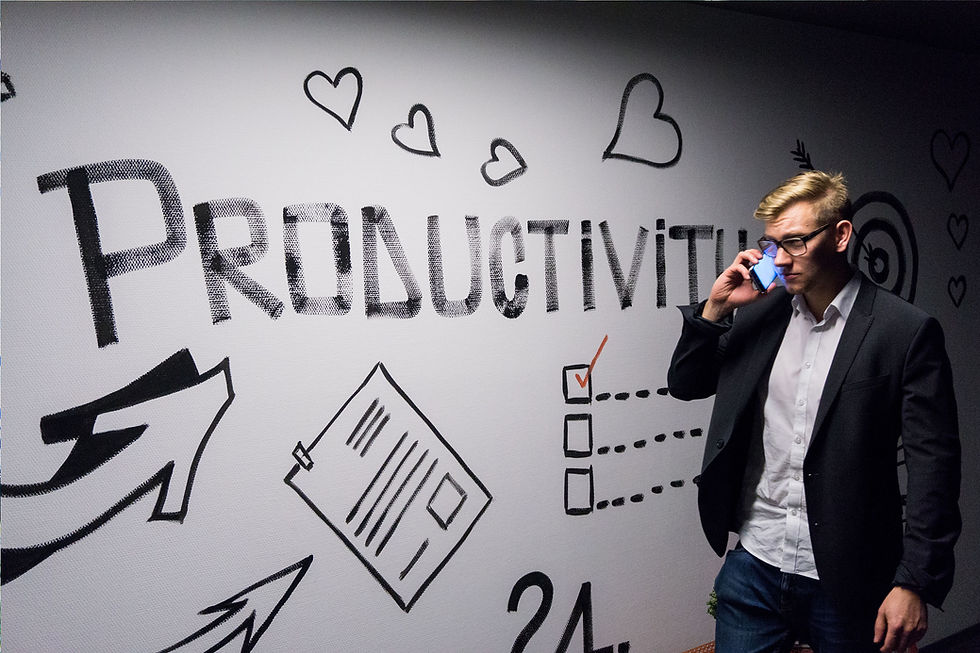1 Creative Productivity Hack You Need to Get More Done
- Dr. Jeff Doolittle

- Oct 25, 2021
- 4 min read

All you need to do is hustle harder and work longer hours. But the work harder and longer hours leadership style comes with a risk of burnout and severe consequences. According to a study by the Mayo Clinic, the personal and organizational side-effects of executive leadership burnout include: broken relationships, substance abuse, depression, decreased customer satisfaction, reduced productivity, and increased employee turnover. Leaders are always connected to their operations in a crisis-driven digital workplace, ready to fight the next fire. This reality amplifies the risk of sacrificing success and significance for less important tasks. CEOs, managers, and decision-makers need a creative productivity hack for improving decision-making and avoiding physical, mental, and emotional exhaustion.
Is your performance suffering from the Urgency Effect?
Most leaders and entrepreneurs are metaphorically running on a treadmill at a speed that makes casual conversation difficult. They live in a world where it is impossible to respond to every email or accept every meeting invitation. Like corporate athletes, these executives have trained themselves to become highly efficient and effective to survive.
“What is urgent is seldom important and what is important is seldom urgent.” President Dwight D. Eisenhower
Author Stephen Covey in The 7 Habits of Highly Effective People, popularized the time management matrix first described by President Eisenhower. This two-by-two grid helps leaders account that in life, we face decisions between what is urgent and important.
The following video is a more humorous discussion if you are unfamiliar with this tool.
Numerous studies have demonstrated that most of us prefer to work on urgent tasks that can be completed quickly. This likely does not come as a surprise. However, compelling recent cognitive psychology studies revealed that we are also more likely to perform unimportant tasks over important tasks when perceived to be more urgent. Psychologists have described this as the Mere Urgency Effect.
If asked, what should you work on, more important or less important tasks? You likely would become annoyed with the obvious line of questioning.
Studies on the Urgency Effect revealed that it is more pronounced among individuals who perceive themselves as busy. This is alarming for entrepreneurs and leaders, given the crisis-driven workplace.

Leaders can anticipate that they are more likely to sacrifice personal and professional goals for less critical tasks when they are busy—for example, choosing to interrupt a conversation with your family to answer a routine email. Today's leaders need a creative productivity hack for performance improvement to moderate an amplified Urgency Effect.

Creative productivity hack for performance improvement
The following productivity hack is not new. It comes from the study of contingency management in the behavioral sciences in the 1980s. You have likely experienced the principle without knowing the scientific name. It is called the Premack Principle, also known as the differential probability hypothesis.
The Premack Principle is a reinforcement view that the opportunity to engage in a relatively high probability behavior will reinforce the lower probability behavior. Aubrey Daniels
This principle has been studied and used to motivate desired behaviors. Simply described, it is waiting to eat our dessert until after eating our vegetables or holding off on shopping for new clothes until we lose the extra weight.
This short video provides more information on the Premack Principle.
How to apply the Premack Principle productivity hack
The following questions can help you apply the Premack Principle productivity hack in the context of the Urgency Effect.
Do you know what tasks are more important than others? If you cannot identify what tasks are more important than others with absolute clarity, try using the time management matrix and clarifying your purpose.
Are you busier than usual? If you perceive you are busy, you are at risk of working on less important tasks.
Urgent and important tasks require immediate action. Ask yourself, is the task more important than the current task you are working on completing? If no, purposely delay working on it ahead of the more important task and identify a way to reward yourself if you follow through.
Working on urgent and important tasks is stressful. If you find yourself constantly working on these types of jobs, you should consider trying one of these tips to break the cycle:
Tip 1: Invest more time in thinking strategically to anticipate the future. Applying strategic foresight tools, such as scenario planning or the futures wheel, can help you see around corners and anticipate multiple potential future realities.
Tip 2: Invest more time in planning: schedule weekly or monthly planning sessions on goals and deadlines with your team. Reflect on how well your new plans work and adjust as needed.
Tip 3: Consider if you are delegating effectively. The following article breaks down how to improve your delegating skills.
Key Summary Points:
Choosing to hustle harder and work longer hours increases your risk of burnout and severe consequences.
The contemporary workplace is crisis-driven, and in an always-on digital world, leaders live on the edge connected to the operations anticipating the next crisis.
We are more likely to perform unimportant tasks over important tasks when perceived to be more urgent.
Today's leaders need a creative productivity hack for performance improvement.
You can apply the Premack Principle productivity hack to moderate the Urgency Effect.
Visit our executive coaching page to learn more about how we help you achieve your personal or professional goals or partner with you to craft a solution specific to your organization's context and challenges. Getting started is as easy as visiting www.organizationaltalent.com or contacting us via email info@organizationaltalent.com. Organizational Talent Consulting utilizes proven, simple, and transformational personal and organizational development solutions to help our clients learn, change, and apply tools in ways that benefit their unique needs and corporate culture.
References:
Covey, S. R. (1989). The seven habits of highly effective people: Restoring the character ethic. Simon and Schuster.
Daniels, A. C. (2016). Bringing out the best in people. McGraw-Hill Education.
Shanafelt, T. D., & Noseworthy, J. H. (2017). Executive leadership and physician well-being: Nine organizational strategies to promote engagement and reduce burnout. Mayo Clinic Proceedings, 92(1), 129-146.
Zhu, M., Yang, Y., & Hsee, C. K. (2018). The mere urgency effect. The Journal of Consumer Research, 45(3), 673.









Comments